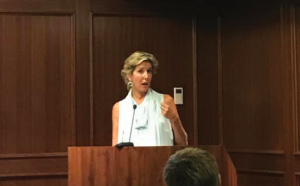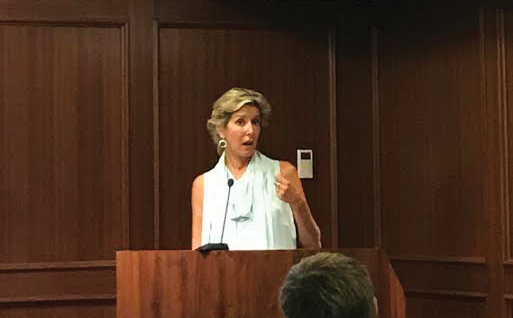
Megan Carey is a staff writer for The Hoya.
Entrenched authoritarian powers in the Middle East can ultimately be democratized with U.S. intervention, according to Danielle Pletka, vice president for foreign and defense policy studies at the American Enterprise Institute.
“We have tons of leverage. We are the most powerful country in the world, we are the richest country in the world. What we don’t have is the moral clarity, we don’t have the vision, and we don’t necessarily have the tools or leadership to do this,” Pletka said.
Pletka kicked off the Center for Jewish Civilization’s speaker series this semester with a talk at the Mortara Center on Wednesday on foreign policy in the Middle East.
Pletka disagreed with scholars who spend much of their time trying to place blame for the “systemic rot” occurring in the region, casting doubt on common claims that Arab culture or Islam are the roots of the problem.
“The notion that we all stick together and talk about the failing of one of the world’s great religions, and that this is really what has held people back, seems patently on its face not to be right,” Pletka said. “There are plenty of Muslim democrats. Indonesia, although it’s having its share of troubles, is a democracy. Bangladesh, although it’s having a lot of problems, has for many years been a quasi-functioning democracy.”
According to Pletka, the main problem facing the Middle East is the systems of governance that have been established in much of the region, including the legacy of Western influence on the region.
“Since the end of the colonial era in the region, there have been imported any number of lousy Western ideologies that have waned and waxed in popularity over the decades,” Pletka said. “There were the monarchies, but many of the monarchies that existed in the aftermath of colonial era and of World War I and World War II were replaced with nominal republics. Those then were replaced with dictatorships.”
Pletka spoke on the various failed movements in the Middle East including Arab socialism and Pan-Arabism in countries such as Syria and Egypt. However, she argued the failure of such movements is a result of the deep entrenchment of many Middle Eastern countries in systems of authoritarian government rather than an incapacity for democracy.
“What each of these regimes have in common is they are fundamentally authoritarian or totalitarian regimes. They’re dictatorships. It should come as no surprise to us that for people in the region who grow with this frame of reference, knowing nothing else other than totalitarianism in their government, they don’t have the frame of reference,” Pletka said.
“People don’t actually know how to do democracy when they’ve never done it before.”
Pletka then made a case for the involvement of the United States and other democratic countries in the Middle East. According to Pletka, these countries have a responsibility to bring democracy to areas of the region and play a part in shaping the advancement of human rights, stressing the significance of addressing instability in the Middle East for the sake of the United States’ own security.
“These are dangerous, virulent ideas that have spread. These are dangerous conflicts, these are dangerous weapons, and when we don’t deal with them there they come find us here,” Pletka said. “We’ve learned to tolerate a low level of unpleasantness that comes with a small terrorist attack because these aren’t shaping our societies. But actually, they do, because small attacks become large attacks. I would argue that Al Qaeda is more powerful now than it was on September 10, 2001.”
Pletka concluded with a final appeal for democracy in the region and affirmed the ability of the United States to defeat its shortcomings in intervention.
“I think the Arab Spring was absolute evidence of that desire for freedom and absolute evidence of the inability of the region to provide that,” she said. “We are engaged in this part of the world. We do have relationships. What we see is every time we pull back countries come to us and ask us to be involved.”




















